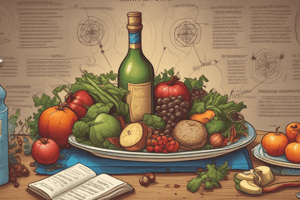Podcast
Questions and Answers
What does Maytah aim to maintain according to Jewish tradition?
What does Maytah aim to maintain according to Jewish tradition?
Maytah aims to maintain a clear distinction between life (dairy products) and death (meat).
What is the concept of Maytah in Jewish dietary laws?
What is the concept of Maytah in Jewish dietary laws?
The concept of Maytah refers to the mixing of meat and dairy products.
What biblical statement forms the basis of the rule regarding Maytah?
What biblical statement forms the basis of the rule regarding Maytah?
"You shall not boil a kid in its mother's milk" (Exodus 23:19).
How has the interpretation of the biblical statement on Maytah varied throughout history?
How has the interpretation of the biblical statement on Maytah varied throughout history?
What is required to observe Maytah in terms of separating meat and dairy products?
What is required to observe Maytah in terms of separating meat and dairy products?
What fundamental distinctions does the separation of meat and dairy products in Maytah reflect in Jewish tradition?
What fundamental distinctions does the separation of meat and dairy products in Maytah reflect in Jewish tradition?
What is Maytah and why is it important in Jewish dietary laws?
What is Maytah and why is it important in Jewish dietary laws?
How do Jewish communities adapt Maytah rules when dining out?
How do Jewish communities adapt Maytah rules when dining out?
What are some controversies related to the practice of Maytah?
What are some controversies related to the practice of Maytah?
Why do some debates exist around the application of leniencies in Maytah practices?
Why do some debates exist around the application of leniencies in Maytah practices?
What is the significance of strictly adhering to the rules of Maytah in Jewish dietary laws?
What is the significance of strictly adhering to the rules of Maytah in Jewish dietary laws?
How do Jewish communities worldwide ensure strict adherence to Kashrut while enjoying diverse cuisines?
How do Jewish communities worldwide ensure strict adherence to Kashrut while enjoying diverse cuisines?
Flashcards are hidden until you start studying
Study Notes
Jewish Dietary Prohibition of Maytah
The concept of Maytah, referring to the mixing of meat and dairy products, is a central aspect of Jewish dietary laws. These rules, known as Kashrut, aim to maintain a clear distinction between life (represented by dairy products) and death (represented by meat). This separation is considered essential in Jewish tradition, reflecting the importance placed on distinguishing between purity and impurity, clean and unclean, and sacred and profane.
Origin of Maytah
In the context of Kashrut, the rule regarding Maytah is based on the biblical statement: "[You shall not boil a kid in its mother's milk](Exodus 23:19)". This commandment can also be found in Deuteronomy 14:21, emphasizing its significance for Jewish law. The exact interpretation of this verse has been subject to various interpretations throughout history. Some view it symbolically, representing the separation between life and death; others see it as enforcing a literal prohibition against boiling meat products in milk.
Separation of Meat and Dairy Products
Traditionally, observing Maytah requires strict separation between meat and dairy products throughout the entire cooking process. Different cooking utensils and dishes must be used, along with separate storage areas. The observation of Maytah extends beyond the kitchen, necessitating careful planning when dining out, selecting restaurants, and even determining appropriate times between consuming meat and dairy products to avoid potential contamination in the digestive system.
Moreover, Jewish communities worldwide have adapted and adjusted these rules according to local culinary practices, ensuring that strict adherence to Kashrut still allows them to enjoy diverse cuisines within their religious framework.
Controversies and Debates
Despite the broad consensus on the necessity of observing Maytah, there remain debates around specific aspects of the practice. For instance, there is ongoing discussion about whether radiative cooking methods, such as using microwaves, are acceptable for preparing mixed meat and dairy dishes. Additionally, there are varying opinions regarding the application of leniencies related to the minimum amounts (known as shiur) of forbidden ingredients that are allowed before a dish becomes prohibited.
Conclusion
The prohibition of Maytah is a core element of Jewish dietary laws, emphasizing the importance of maintaining purity and distinction in daily life. Despite the challenges and complexities involved in strictly adhering to these rules, they serve as a testament to the enduring commitment of many Jewish individuals and communities to preserving their cultural and religious identity through food choices.
Studying That Suits You
Use AI to generate personalized quizzes and flashcards to suit your learning preferences.




